Francis ledwidge Biography
Born on the 19th August 1887 Francis was the eight of nine children born to Patrick and Anne Ledwidge. He was the first child born in the family's new home, at Janeville just outside the village of Slane situated in the Boyne Valley, some thiry miles north of Dublin. Christened Francis Edward but known as Frank to his family and friends the fledgling poet would know hardship from an early age. His father died when he was just four years old and only three months after the birth of his youngest brother Joseph. the burden fell on his mother Anne to provide for the family by undertaking back breaking work for the farmers in the fields for a meager eight shillings a week.
Despite the initial hardship the literary talents of Francis flourished from an early age. Described as an "erratic genius"by his schoolmaster Mr. Thomas Madden. Francis joined a literary society for juveniles and was introduced to classic stories like, The Arabian Nights, Robinson Crusoe, Don Quixote and the poetic works of Shakespeare, Keats and Longfellow. From as soon as he could write Francis indulged in the creation of rhyme and verse:
'While I was still at school many silly verses left my pen, written either for my own amusement, or the amusement of my companions. Indeed I left many an exercise unfinished hurrying over some thought that shaped itself into rhyme...'
Upon finishing school the young poet went to work in Slane Castle, seat of the Marquis of Conyngham, as a trainee houseboy under the watchful eye of the cook. Lady Conyngham's instructions for the menus of the day were written down by the cook on a slate. One morning Francis rubbed out the day's orders and substituted a rougher bill of fare,consisting of pig's feet, cabbage, spuds. The cook did not see the humour in this prank and Francis was fired.
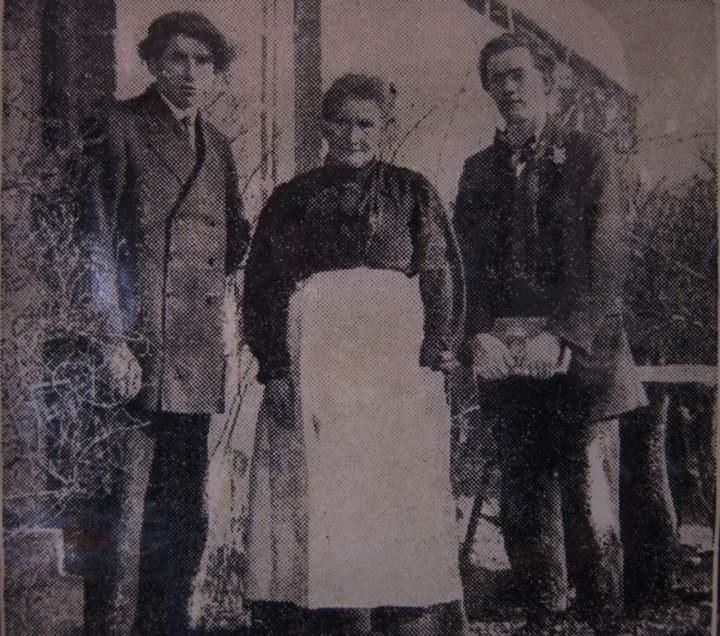
Francis with his mother Anne
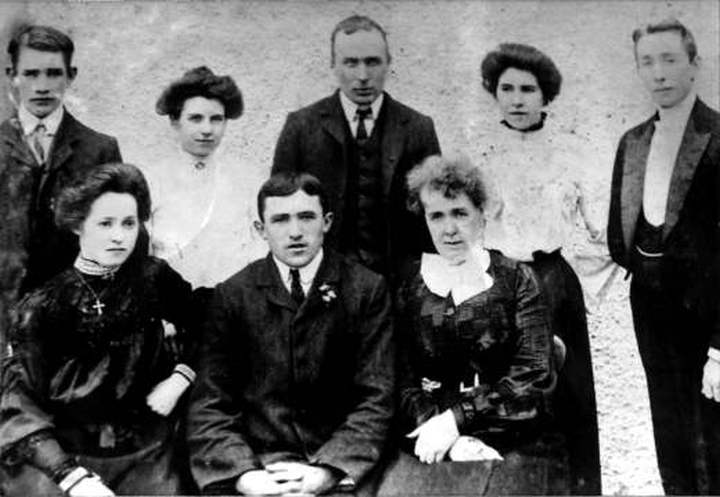
Francis, standing on left of picture,aged 15, with Slane Castle staff
In the following years Francis undertook a variety of jobs in the Slane area including groom, farmhand, roadworker and miner. He continued to write poetry and had many of his poems published in the local newspaper the Drogheda Independent. Many of these poems were taken to the newspaper office by Ellie Vaughey, the younger sister of his friend Paddy. Their relationship soon developed into love and Ledwidge wrote numerous poems which spoke of Ellie's beauty:
'I wait the calling of the orchard maid,
Inly I feel that she will come in blue,
With yellow on her hair, and two curls strayed
Out of her comb's loose stocks, and I shall steal
Behind and lay my hands upon her eyes,
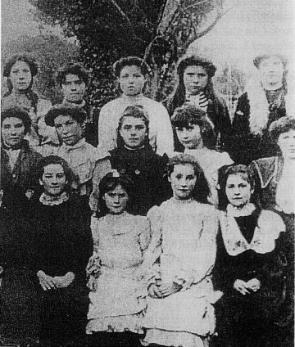
During this time Ledwidge acquired a patron in the form of a local aristocrat, Lord Dunsany. Dunsany wrote of the young poet;
'I was astonished by the brilliance of that eye that looked at the fields of Meath and seen there all the simple birds and flowers,with a vividness that made those pages like a magnifying glass,through which one looked at familiar things seen thus for the first time.I wrote to him greeting him as a true poet,which indeed he was.....'
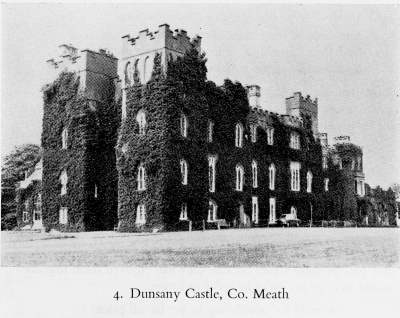
Dunsany ensured that the poetry of Ledwidge would find a wider audience as his poems began to be published in the literary magazine Saturday Review. Dunsany also facilitated the introduction of the young poet to the Irish literary circle which included AE (George Russell), Thomas Mac Donagh, Katherine Tynan and James Stephens amongst others.
Frank was good company and had many friends. He was involved in many aspects of the local community and was a natural leader and innovator. He founded the Slane Drama Group in which he was actor and producer.
The poet was a keen political activist. While employed in Beauparc copper mines Frank organised a strike for more tolerable working conditions. He held the position of the General Secretry of the Slane branch of the Meath Labour Union Approved Society for a year and was elected to the Navan Board of Guardians and also the Navan Rural District Council. Both Frank and his younger brother Joe were founder members of the Slane corps of the Irish Volunteers founded in 1913 in response to the establishment of the Ulster Volunteers by Edward Carson to resist Home Rule.
At the same time the whole political landscape was changing. On Augest 4th,1914 England declared war on Germany and so began the Great War. Frank enlisted in the Royal Inniskilling Fusillers at Navan and was sent to Richmond Barracks in Dublin. It is impossible to say why Ledwidge enlisted in the army. One strong reason for the poet's enlistment is the loss of his love, Ellie Vaughey. Ellie had a new escort, a local man called John O'Neill. Ellie went on to marry John O'Neill and settle in Manchester, yet sadly she died shortly after childbirth just a year later.
Ledwidge wrote many elegies to Ellie including the poignant 'To One Dead'.
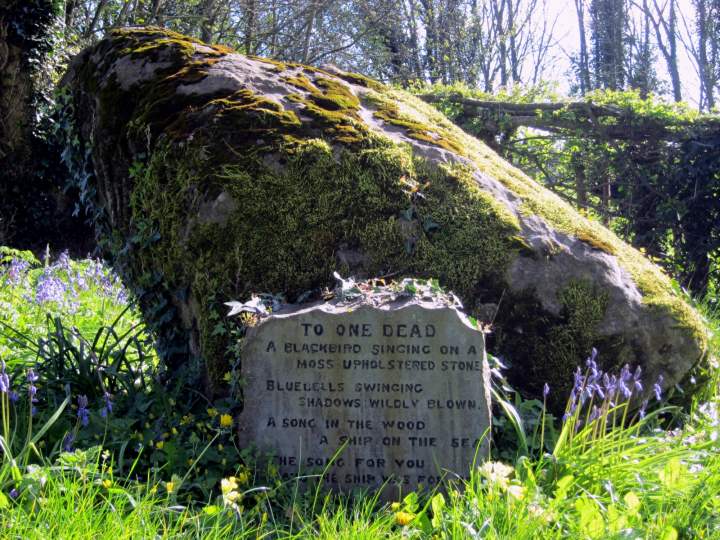
Frank's first introduction to the war was at Gallipoli. He wrote no poetry during the eight weeks he spend on the campaign but was lucky enough to be included among the 118,000 men who were evacuated from the peninsula. Serbia was the next scene of warfare for Ledwidge and despite the harsh cold and wet weather which afflicted Frank with rheumatism the poet was in good spirits as he heard new of the publication of his first book of poems entitled Songs of the Fields. He was so delighted with the volume that he described it as "better to him than food and warmth."
The allies were defeated in Serbia and the army was forced to retreat. Ledwidge had a badly inflamed back and eventually reached Western General Hospital in Manchester.
He was in Manchester when news reached him of the the 1916 Easter Rebellion in Dublin and the execution by the British of his good friend and fellow poet Thomas MacDonagh. Ledwidge's poem Lament for Thomas MacDonagh is widely regarded as one of his greatest works.
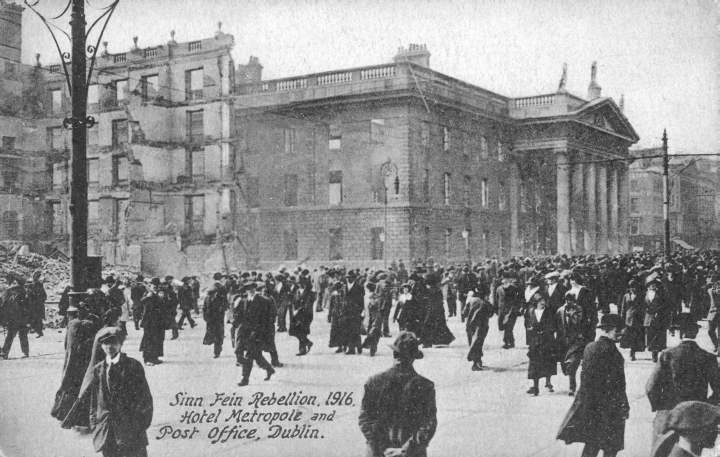
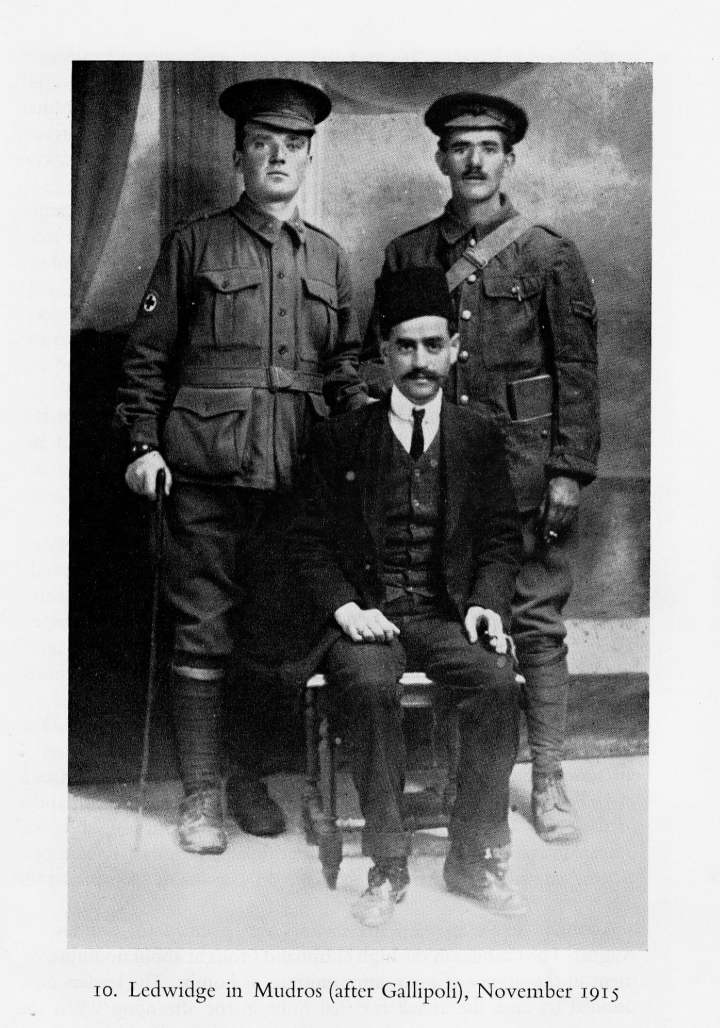
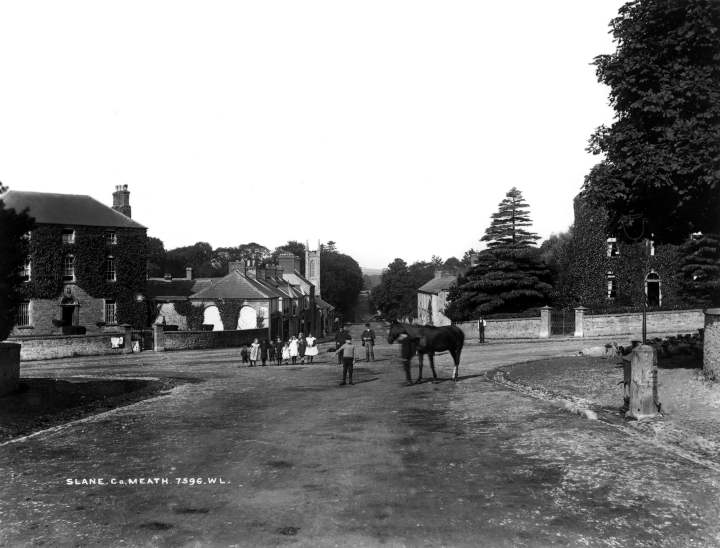
In July 1917 having survived the Battle of Arras, Ledwidge's unit was ordered north to Belgium in preparation for the third
Battle of Ypres. Despite the horror of war his love for nature and his home remained unabated.
On July 20th he wrote a letter to his friend and fellow poet Katherine Tynan in which he spoke of his longing for home.
"I want to see again my wonderful mother, and to walk by the Boyne to Crewbawn and up through the brown and grey rocks of Crocknaharna. You have no idea of how I suffer with this longing for the swish of the reeds at Slane and the voices I used to hear coming over the low hills of Currabwee. Say a prayer that I may get this leave, and give us a condition my punctual return and sojourn till the war is over."
Unfortunately this prayer would go unanswered as all leave was cancelled until after the battle. On 31 July the 1st Battalion of the Royal Inniskilling Fusiliers, of which Frank was a member, were repairing the road to Pilkem near the village of Boezinghe northwest of Ieper (Ypres). In the afternoon of that day a shell exploded beside them, killing one officer and five enlisted men, among them Ledwidge. Chaplain Father Devas was among the first to arrive on the scene. That night he wrote in his diary:
"Ledwidge killed, blown to bits…"
The men were buried were they fell at Carrefour de Rose (Rose Crossroads) and reinterred later in nearby Artillery Wood Military Cemetery.
Lance Corporal Francis Edward Ledwidge is buried in plot 2, Row B, Grave 5.
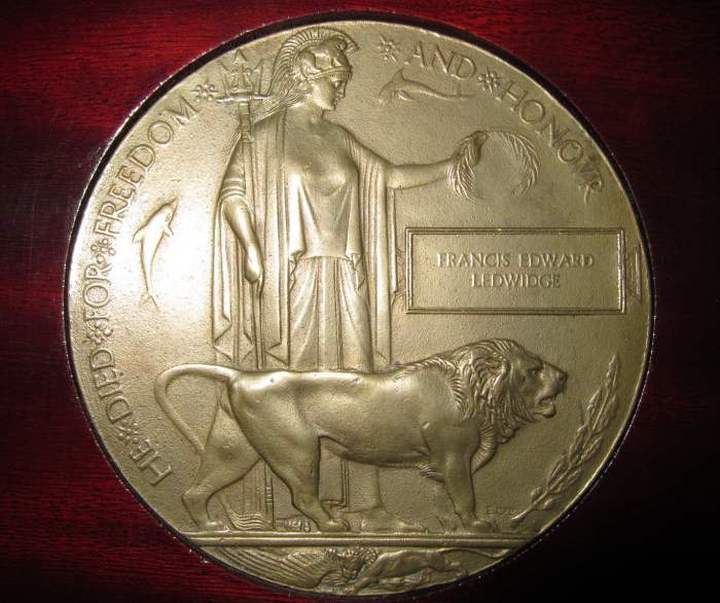
Death plaque sent to Frank's mother Anne
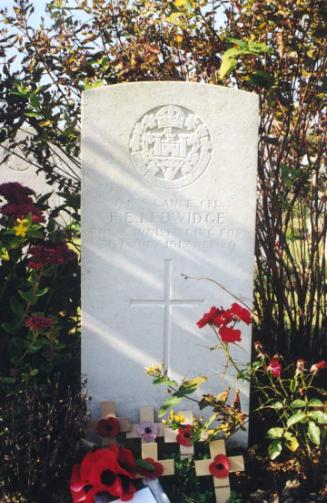
The Ledwidge memorial in the Museum garden at Janeville in Slane is an exact replica of the memorial that stands on outskirts of Boezinge, a small village 6kms north of the town of Ieper (Ypres) in Belgium and was unveiled on 31st July 2001 by Joseph Ledwidge and Pearl Baxter.(see video)
The In Flanders Fields Museum, Ieper, erected the original memorial on the exact spot where the poet was killed on 31st July, 1917. It was unveiled in 1998 by the poet/author Dermot Bolger and the poet's nephew Joseph Ledwidge from Slane, Co. Meath.
The top panel of the memorial has an inscription from a verse of his poem "Lament for Thomas McDonagh"
He shall not hear the bittern cry
In the wild sky, where he is lain
Nor voices of the sweeter birds
Above the wailing of the rain.
The image of Ledwidge on the panel is said to reresent his
ghostly image coming through the Ieper brick.
Francis ledwidge Museum, Janeville, Slane, Co.Meath, Ireland. Tel: +353 41 9824544 www.francisledwidge.com